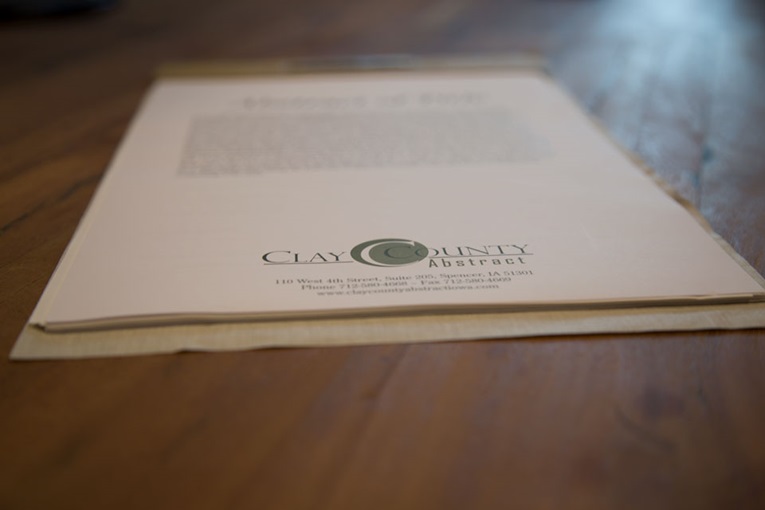
In Iowa, the abstract of title holds immense significance in all real estate transactions. Prior to selling your property, it is imperative to have your abstract of title updated and meticulously examined for any potential title defects.
To gain a comprehensive understanding of abstracts and their essential role in selling a home in Iowa, continue reading.
In the event that you are unable to locate your abstract, we will provide you with valuable suggestions on where to initiate your search.
An abstract of title, also known simply as an abstract, is a legal document that presents the current and historical ownership records of a particular property. It serves as a physical and chronological record of the property’s history, based on publicly accessible documents.
Upon the sale of a property in Iowa, the information contained within the abstract is updated, and a thorough examination for title defects, which are issues or problems that may impact future owners, is conducted.
Now, one may wonder, how does the abstract differ from the title? The title is a legal document specifying the current owner of the property. In Iowa, abstracts encompass the complete history of ownership and other pertinent property details.
The contents of a property abstract are sourced from public records, thus comprising various public documents pertaining to the property. These may include owner information, deeds, the property’s plat map, easements (land utilized by non-owners, such as utilities), survey information (to determine property boundaries), covenants and restrictions (regulations set by Homeowner’s Associations [HOA] or subdivisions), liens (unpaid debts attached to the property), unreleased mortgages, wills, litigation, tax sales, and special assessments (property tax or HOA assessments).
The abstract’s significance when selling your home in Iowa cannot be overstated. As soon as you accept an offer from a prospective buyer, the process of updating the abstract must commence promptly. This updating process can take up to a week and involves sending the abstract to an abstract company or attorney.
Once the abstract is up-to-date, an attorney carries out a title opinion. This opinion is a thorough review of the abstract to determine whether the property possesses a marketable and clear title.
The title opinion serves a crucial purpose by revealing any title defects. It serves as a safeguard for the buyer against potential future financial or ownership problems. These defects could include unresolved liens, judgments, flawed legal descriptions, or other issues that could impact the future owners of the property.
Buyers seek reassurance that they will not encounter unexpected complications related to the property’s ownership after the purchase. If no title defects are found during the title opinion process, the title is considered cleared.
However, if title defects are identified, the seller must address and rectify them before proceeding with the closing.
To “clear” a title means that the seller takes necessary action to resolve any identified title defects, which could involve simple tasks like correcting misspellings or more complex actions like paying off liens or obtaining mortgage releases.
Iowa follows a unique approach by not allowing the sale of private title insurance, unlike most other states. Instead, Iowa utilizes the abstract and title opinion to ensure that the buyer obtains a clear title before the closing.
Upon updating the abstract and clearing the title, buyers in Iowa receive protection through the Iowa Finance Authority, a state agency. Title insurance is provided by Iowa Title Guaranty, shielding buyers from potential financial repercussions arising from any title defects.
Though Iowa’s process may seem complex at first glance, it is more straightforward and cost-effective than many other states’ systems. Unlike states with expensive insurance agent commissions and intense competition among insurers, Iowa’s system often offers better protection to property buyers.
The decision to prohibit the sale of private title insurance in Iowa was influenced by the bankruptcy of insurance companies during the 1930s, which rendered them incapable of safeguarding home buyers from title defects. The resulting financial consequences for some property owners prompted the adoption of the current system.
Locating your abstract of title is crucial when you own a property, as it remains your responsibility to keep track of it for future transactions. Although abstracts can be replaced if lost, the process can be costly.
An abstract typically comprises numerous pages of bound documents, varying in length depending on the property’s age. Older properties may have significantly more pages in their abstracts.
When searching for your abstract, it is recommended to begin by checking your home and then contacting relevant businesses, such as your mortgage company and attorney’s office.
Common locations for storing abstracts include home fire safes, safe-deposit boxes at banks, as well as with mortgage companies, title companies, and attorneys’ offices, which often issue receipts to customers upon storing their abstracts.
If you are unable to locate your abstract, it may be necessary to have a professional abstractor recreate it.
Finally, while we are not legal professionals and cannot offer legal advice, we are specialists in buying houses. So if you need to sell your home quickly, regardless of its condition, we can assist you in finding a suitable solution. Our team consists of genuine and experienced individuals dedicated to helping you.

